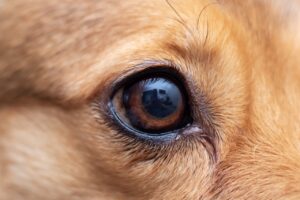Vestibular Syndrome refers to a disease group that affects the vestibular system, which affects the balance system. This disease can be caused by many things, such as nerve or brain tumours, infection, inflammation, or an underactive Thyroid gland. Alternatively, even with extensive investigation, no cause may be found. In this case, it is called idiopathic vestibular syndrome.
 Vestibular Syndrome can affect dogs and cats. Common symptoms include loss of balance, falling over, flickering of the eyes, and general unsteadiness on their feet. Vestibular Syndrome can be very upsetting for both the pet and its owners, but it usually improves over time.
Vestibular Syndrome can affect dogs and cats. Common symptoms include loss of balance, falling over, flickering of the eyes, and general unsteadiness on their feet. Vestibular Syndrome can be very upsetting for both the pet and its owners, but it usually improves over time.The Vestibular system controls balance in pets and keeps them balanced in different situations. The vestibular system has sensors deep in the inner ear and a control centre at the back of the brain. These sensors ensure the body and position of the head are in the right place, whether they are standing or moving, by sending messages to the brain and other parts of the body. Messages are also sent to the muscles, controlling eye movement according to where the head is positioned.
The signs of Vestibular syndrome are the same in dogs and cats and include falling, tilting the head with one ear lower than the other, rapid flickering of the eyes from side to side or up and down, inability to walk in a straight line, drifting off to one side, and acting abnormally.
The balance centre is also close to the part of the brain that controls vomiting, so the patient may feel or be sick. They may also have hearing loss, and their face may droop. Other signs may include seizures, weakness, loss of vision, and difficulty eating or drinking.
If you suspect a vestibular system problem, you should go to the vet as soon as possible. The vet will determine what tests and treatments are necessary, or they may not give any treatment at all. They may need to perform CT or MRI brain scans and further investigations, including taking a sample of the fluid around the brain and spinal cord. Drugs will vary and may include antibiotics, steroids, and anti-nausea drugs, all depending on how the animal is affected.
Depending on the underlying cause, the prognosis will vary. Some animals are left with a permanent head tilt, and others may need no treatment and may need to make a full recovery. The cause may be an ongoing condition that needs treatment, but this will vary depending on the animal.
Learn more about pet first aid on one of our video online courses at www.propetfirstaid.co.uk Courses nationwide or virtually, contact us for more information on support@protrainings.uk or phone 01206 805359.

